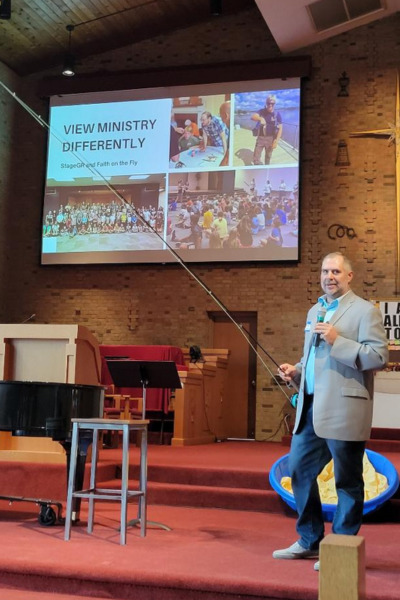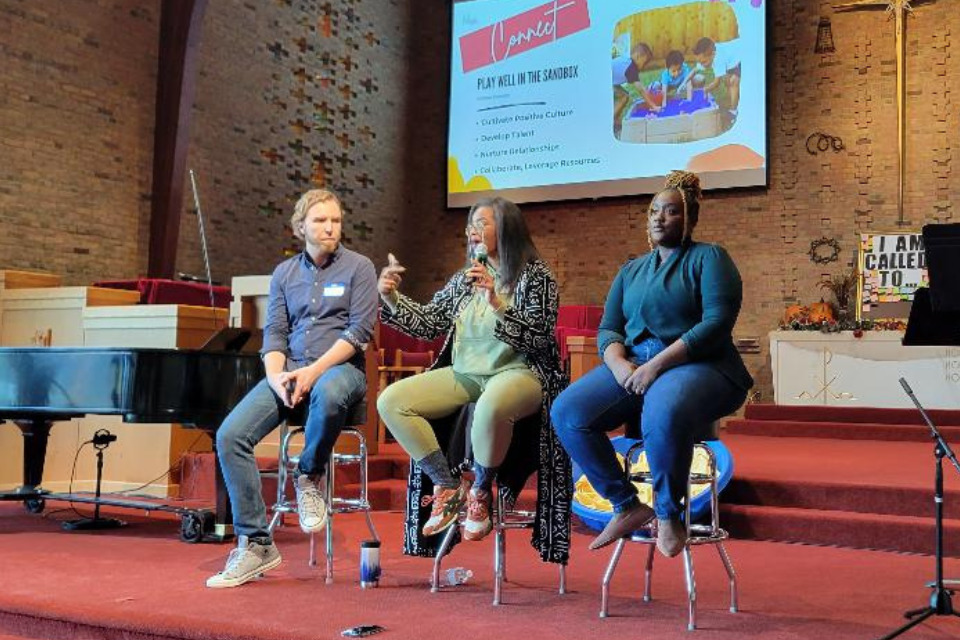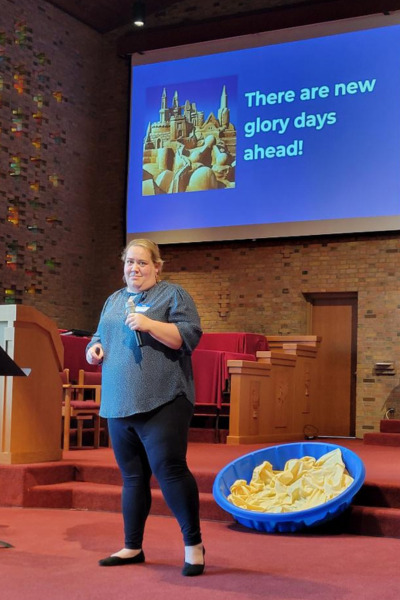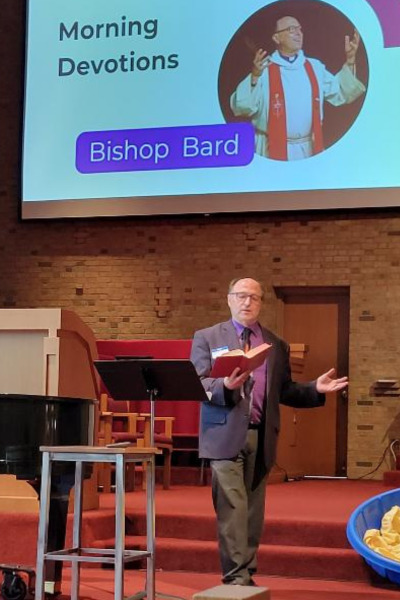PART A: On September 30, 2023, eighty persons gathered from across the Michigan Conference to get fired up about Starting & Sustaining Ministries of Compassion, Justice, and Inclusion.
KAY DEMOSS
Michigan Conference Communications
There’s a season for everything. The Bible tells us so. For the past seven years, United Methodists in Michigan have been enduring a season of change and wonder. Change. Two conferences becoming one, a denomination becoming two, and a pandemic. Wonder. Will my congregation survive this season? Will our ministries? Will I?
The Michigan Conference Board of Global Ministries hosted an event on September 30 aimed at providing encouragement, ideas, and tools for weathering this season of uncertainty. The focus was Starting & Sustaining Ministries of Compassion, Justice, and Inclusion. Some drove to Mt. Pleasant, and others arrived via Zoom for inspiration and learning about connection with their communities.
Morning messaging came from leaders of EngageMI ministries of the Michigan Conference. They provided strategic thinking around three key aspects of ministry: 1) Listening and Launching, 2) Sustaining and Growing, and 3) Re-starting and Pivoting. There was plenty of time to interact with presenters and other participants during the remainder of the day.
Listening and Launching
Matt Witkowski is a good listener. Matt serves as director of the Community Ministries at Trinity United Methodist Church in Grand Rapids. He has also started two ministries — The Seen Project and Faith on the Fly — that have proven him skilled at launching programs that serve needs in the community.

Matt called participants’ attention to five strategies for planning a new ministry.
-
- Notice everything around you. What do you see? Signs in yards. Vegetable gardens in backyards. Boats in garages. What do you hear? Example: “Teachers are exhausted.” “Noticing things puts little pieces of your community puzzle together for you. Notice the things you could connect in that create ministry with not ministry to your neighbors.”
- Don’t put your name on it. When you’re doing good, people know. “Do ministry because it’s the right thing to do without taking credit.”
- View ministry differently. Stretch outside the church box. One nontraditional ministry hosted by Trinity UMC is Stage GR. They offer 500 students the hospitality of their basement for rehearsing plays to be staged elsewhere in the city. Faith on the Fly involves all ages in faith sharing as well as fishing.
- Sit-downs, church tours, and coffee. “People are scared of churches,” Matt said. “I often have to undo what churches with an agenda have done.” Invite a community leader to coffee in your building. Listen to their story. Show them the building and talk about how space is being used. Don’t tell them what they could do in your space. “They have already started to think about those possibilities themselves.”
- Do ministry you’re passionate about. Let your excitement make others excited. “The focus is not ‘Come to Jesus.’ When you talk about things you are doing at your church that you are excited about, that’s evangelism.” Matt adds, “Do stuff, and people won’t want to miss out.”
Matt cautioned church leaders, saying, “Churches too often want to do what they want to do.” He emphasized again the importance of awareness of needs in the community. “Be clear there are no hidden strings as you build these relationships. Come in slow with random acts of kindness.” He concludes, “There are tons of needs out there. These are opportunities to put faith in action.”
Sustaining and Growing
Three leaders from Flint Freedom School Collaborative provided insight into how ministry can keep going and even expand. Ashnee Dunning (Executive Director), Ryan Beuthin (Operations Director), and Marquetta Hall (Project Director) took turns explaining how Freedom Schools grew “from a project in a church into an organization.”
CDF has 200 schools across the country. Freedom Schools provide a six-week summer program that has changed the lives of 74 million young people in K-12.
Ryan began, “Seven years ago, we were at Bethel United Methodist Church in Flint doing a project of the Children’s Defense Fund. What we are talking about here would have sounded crazy to us just a few years ago.” There are now three Freedom Schools in Michigan hosted by Flint Calvary, Hope, and Bethel UMCs, serving 100 children. Sites in Detroit and East Lansing are also being explored. These Michigan schools are part of a conference-wide focus on literacy and empowerment of children called the Readers to Leaders campaign.

How did this growth take place? In 2019, conference staff worked with Ryan and Ashnee on “a way to get up higher” by forming a nonprofit corporation. Using this “scaffolding” of tools and resources, the Michigan Freedom Schools were incorporated in 2021 and achieved nonprofit status in 2022.
They compared this growth process to building sandcastles and offered three takeaways from the sandbox to those gathered in the Mt. Pleasant sanctuary.
-
- Start small and then progress. In the beginning, don’t think infinite and forever. Ryan’s advice is, “Make small, reasonable, and finite messes, always reflecting on what you do. Live in the water as you build your sandcastle.”
- Nurture relationships. Ashnee adds, “Play well in your sandbox by cultivating a positive culture. Develop talent, nurture relationships, collaborate, and leverage resources. Dream work makes the team work.”
- Consider data. The importance of good data was emphasized by Marquetta. “Collect your data before you reflect on the ministry. Streamline and digitize the feedback you receive. Applied feedback helps us improve, sustain, and grow.”
Ashnee notes that building a solid foundation on sand requires always being mindful of why you do what you do. She asserts, “Trust God. God gave you a vision. When all else fails and times are difficult, remember God gave you that vision for a reason.”
“The sandbox gets tense around perception of scarcity,” Ryan observes. “Take the high road and ask, ‘Can we write a grant with you?’ rather than competing with you for those dollars.” Marquetta underscored the importance of “modeling excellence” in your ministry.
Re-starting and Pivoting
The Rev. Kim Bos, Campus Pastor and Executive Director of Wesley at Ferris State University, had encouraging words for those in post-pandemic ministry panic. “The rains come down, and the floods come up,” Kim reflects. “Some of us are in 40-60-year-old ministries that have lost some energy and are not meeting the same needs that once did.”

She had suggestions for those who find themselves thinking, “Nothing is what I thought it would be.” To PIVOT takes . . .
-
- Purpose. “Protect the why,” Kim states. “Don’t let your ministry start to do something it’s not really about.”
- Imagining what could be. When a ministry can no longer be done like it’s always been done, think of how to meet needs in new ways.
- eValuation. Don’t be a feelings-based ministry. Keep data and be ruthless with that data. Use honest evaluation to determine if something is still working.
- Own mistakes. Be ready to say you’re sorry rather than lay blame. “Be willing to say, ‘My bad and I will fix it’ . . . sometimes undoing wrongs you did not do yourself.”
- Team up. Find your people. “Make something amazing” together with those who care about the same things you care about.
Saying that churches sometimes “build idols,” Kim challenged participants to have the courage to end ministries that are no longer working. “Until we see ourselves as something else, we can’t move beyond what we’ve always been,” she exclaimed. When asked how to handle the pain and fear of bringing a ministry to a close, she said, “Take a victory lap! Celebrate what they’ve done. Grieve what is lost. Help them see themselves in where they are going next.”
Kim ended on a positive and hopeful note: “The glory days are not over! New glory days are coming. New cool stuff is coming. The Holy Spirit is still relentless in its calling. Your sandcastle will be incredible!”
Seeds Bear Fruit
The invitation to the Starting and Sustaining event said this. “Gather with creatives, community organizers, and change makers. Hear stories from EngageMI project leaders about how they started and restarted.”
How does one become a “change maker”? Several of the day’s presenters had themselves participated in “Seed to Harvest.” This Michigan Conference initiative started in 2020, based on Ministry Incubators’ techniques for hatching new ideas. Lisa Batten, then the Coordinator of Young Adult Ministries, serves as coach and consultant to dreamers and imagineers across the conference.

Matt Witkowski was part of the pilot cohort for Seed to Harvest. His Seen Project continues to connect churches with school libraries in their communities. Church volunteers deliver packages full of books with positive representations of children with special needs and disabilities. “The Seed to Harvest experience taught me how to take something I am passionate about and start something new,” Matt says.
The Holy Broken Heart Album, released in October 2022, was incubated by the Rev. Sari Brown. Sari sang from the heart during closing worship in Mt. Pleasant on September 30. She says, “The main thing Seed to Harvest did was create a structure for me to refine my vision and grow excitement around it. It also helped me gain confidence in my vision.”
Staff members of the Flint Freedom School Collaborative call Lisa Batten “our fairy godmother, cultural translator, wise counsel, and navigator.” During the water crisis in 2017, Batten, along with the Rev. Paul Perez, saw that the freedom school at Bethel UMC “had the capacity to grow.” The incubation process supported Ryan Beuthin and Ashnee Dunning in the development of multiple freedom school sites. Marquetta Hall arrived in 2018. By June of 2022, with the help of additional mentoring provided by incubation coach Batten, the collaborative launched as a nonprofit. Ashnee reports, “Lisa, Paul, and incubation took us from a lofty vision to a timeline and actual plan for a 501(c)(3).” Ryan adds, “Lisa helped us build a scaffold for freedom schools to go higher. The United Methodist Church expects no kickback. They provide the scaffold because it’s the right thing to do.”
During their presentations, these incubators encouraged those attending the Starting & Sustaining event to incubate some bold ideas of their own.
God’s Mission, not Ours
Bishop David Bard offered spiritual grounding during opening and closing worship. He reminded those assembled of the line from Mission Impossible, “Your mission, if you choose to accept it . . . .” The bishop then proclaimed, “As followers of Jesus, we have some choice about the kind of mission we will engage in. But we have no choice about being missional people. It comes with following Jesus.”

Quoting The Book of Discipline, the bishop explained that mission is about in-reach and outreach, “interweaving evangelism and doing good.” Further, he defined mission as “God’s work,” making our ministries of compassion, justice, and inclusion “a reflection of what God is up to in the world.” Kindness and courtesy were named as qualities of those who join with God in God’s patient, persistent works of love.
Paul’s words from 1 Corinthians 13 were read as a key missional text about “what God is up to in the world and how God is up to it.” Bishop Bard noted, “Our way of joining God’s mission is not being boastful or arrogant or rude. It is not as though we show up and bring God, and let everybody know that we are bringing God, and that they are really lucky that we are there bringing God. It is showing up and finding out what God is already doing in that place, then joining in God’s work.”
Participants were reminded that “you don’t have to start all of the missions you will hear about today. That’s not sustainable.” But Bishop Bard concluded, “Though you can’t do it all, as a follower of Jesus, you must do something.”
Some came to Mt. Pleasant wondering about the survival of the church. The bishop invited all present to become lost in the wonder, love, and praise of building God’s Kin-dom. That’s indeed good news during a season of uncertainty and change.
Starting and Sustaining Ministries of Compassion, Justice, and Inclusion was livestreamed from the sanctuary of First United Methodist Church in Mt. Pleasant. The recording can be viewed on the Facebook page of the Michigan Conference of The United Methodist Church.
~ The Starting and Sustaining event was hosted by the Conference Board of Global Ministries. Ministry Shares dollars supported this day of leadership training and resourcing of mission leaders across the Michigan Conference. Full payment of Ministry Shares is Step One in becoming an EngageMI congregation.


